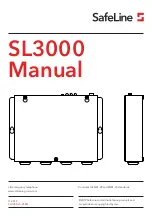
153
Glossary
Gigaset DX800A all in one / USA EN / A31008-xxxxx-xxxx-x-xxxx / Glossary.fm / 06.09.11
V
e
rsion 4, 16.0
9
.2005
Glossary
A
ADSL
Asymmetric Digital Subscriber Line
Special form of
DSL
.
ALG
Application Layer Gateway
NAT control mechanism of a router.
Many routers with integrated NAT use ALG.
ALG lets the data packets in a VoIP connec-
tion pass and adds the public IP address of
the secure private network.
The router's ALG should be deactivated if the
VoIP provider offers a STUN server or an out-
bound proxy.
See also:
Firewall
,
NAT
,
Outbound proxy
,
STUN
.
Authentication
Restriction of access to a network/service by
using an ID and password to log in.
Automatic ringback
See
Ringback when the number is busy
.
B
Block dialling
Enter the complete phone number, and cor-
rect it if necessary. Then pick up the receiver
or press the speaker key to dial the phone
number.
Broadband Internet access
See
DSL
.
C
Call divert
= CD
Automatic diversion (CD) of a call to a differ-
ent telephone number. There are three kinds
of call divert:
– CDU, Call Divert Unconditional
– CDB, Call Divert Busy
– CDNR, Call Divert No Reply
Call swapping
Call swapping allows you to switch between
two callers or between a conference and an
individual caller without allowing the wait-
ing caller to listen to the call.
Call waiting
= CW
Network provider feature. A beep during a
call indicates that another caller is waiting.
You can accept or reject the second call.
You can activate/deactivate the feature.
Client
Application that requests a service from a
server.
Codec
Coder/decoder
Codec is a procedure that digitalises and
compresses analogue voice before it is sent
via the Internet, and decodes – i.e., translates
into analogue voice – digital data when
voice packets are received. There are differ-
ent codecs, with differing degrees of com-
pression, for instance.
Both parties involved in the telephone con-
nection (caller/sender and recipient) must
use the same codec. This is negotiated
between the sender and the recipient when
establishing a connection.
The choice of codec is a compromise
between voice quality, transmission speed
and the necessary bandwidth. A high level
of compression, for example, means that the
bandwidth required for each voice connec-
tion is low. However, it also means that the
time needed to compress/decompress the
data is greater, which increases execution
time for data in the network and thus
impairs voice quality. The time required
increases the delay between the sender
speaking and the recipient hearing what has
been said.
















































